Module 2 Unit 5 Open Day Period 1 Grammar 一般过去时精讲 牛津上海版六年级英语上册 课件 (共38张PPT)
文档属性
| 名称 | Module 2 Unit 5 Open Day Period 1 Grammar 一般过去时精讲 牛津上海版六年级英语上册 课件 (共38张PPT) |

|
|
| 格式 | pptx | ||
| 文件大小 | 2.3MB | ||
| 资源类型 | 教案 | ||
| 版本资源 | 牛津上海版(试用本) | ||
| 科目 | 英语 | ||
| 更新时间 | 2023-09-23 15:08:38 | ||
图片预览


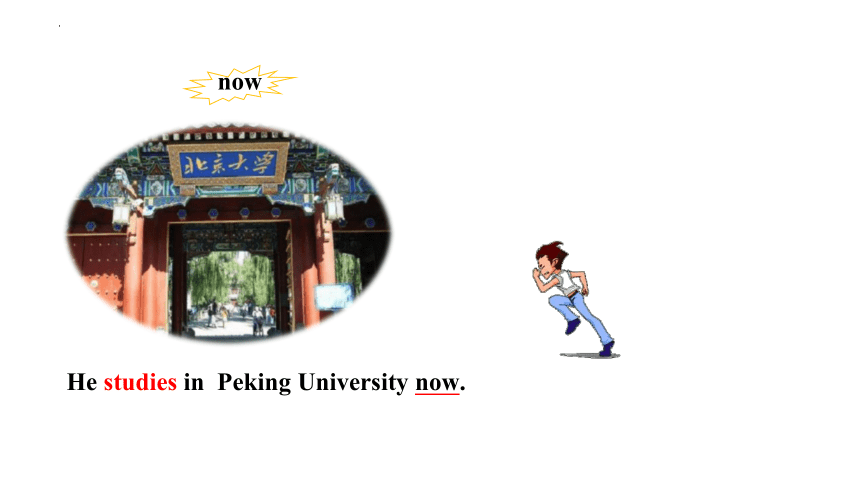
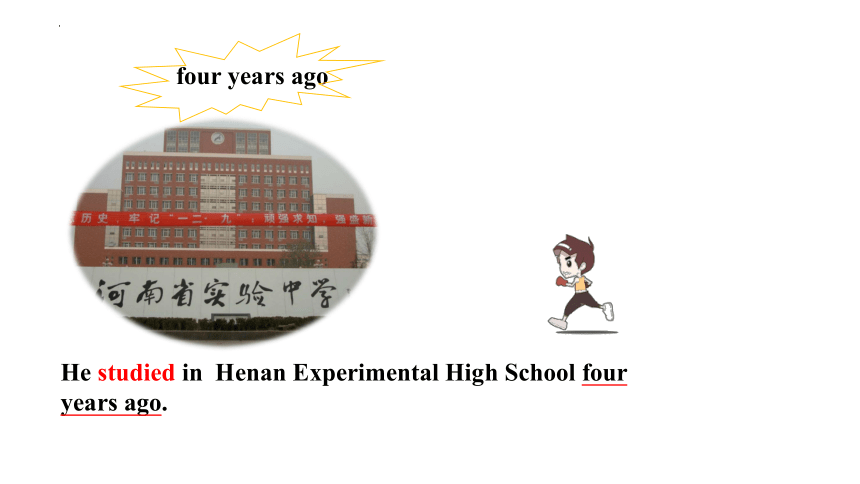
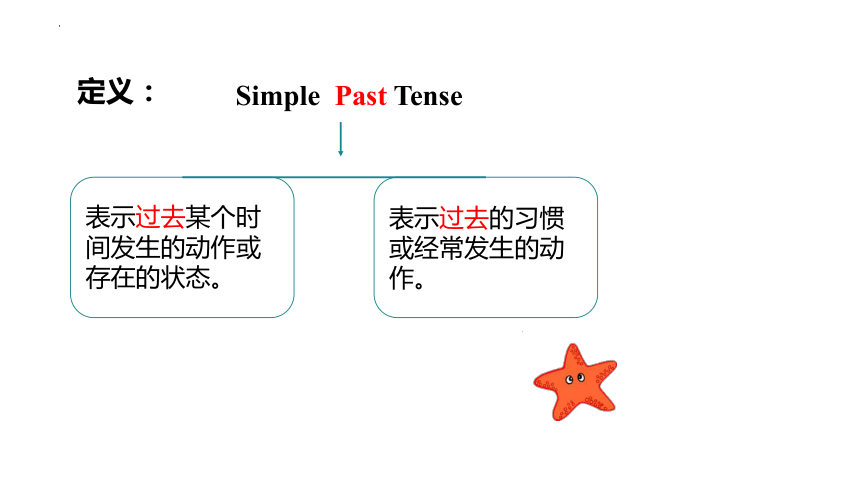

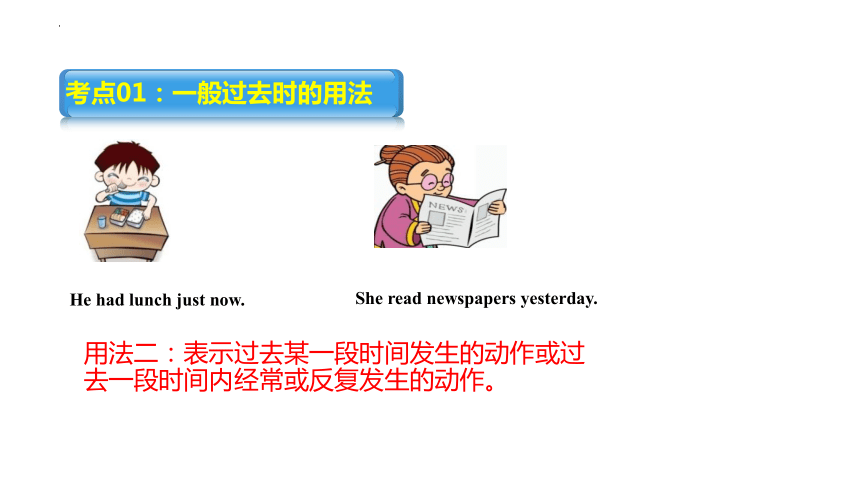
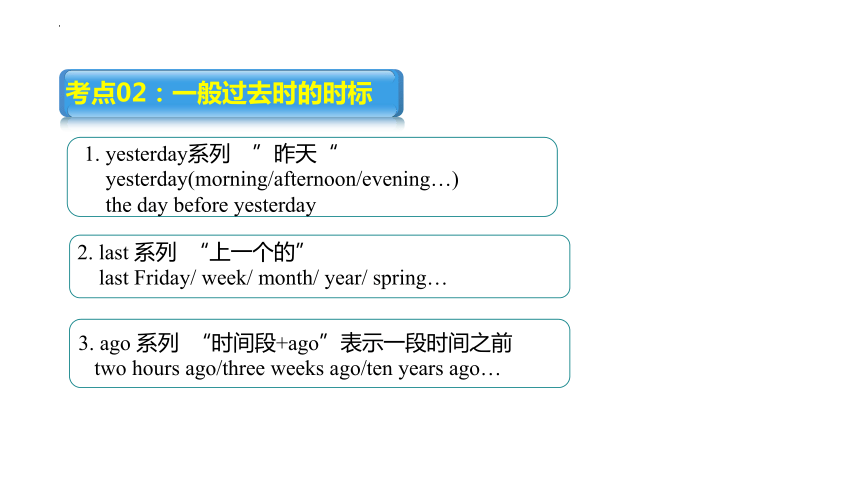
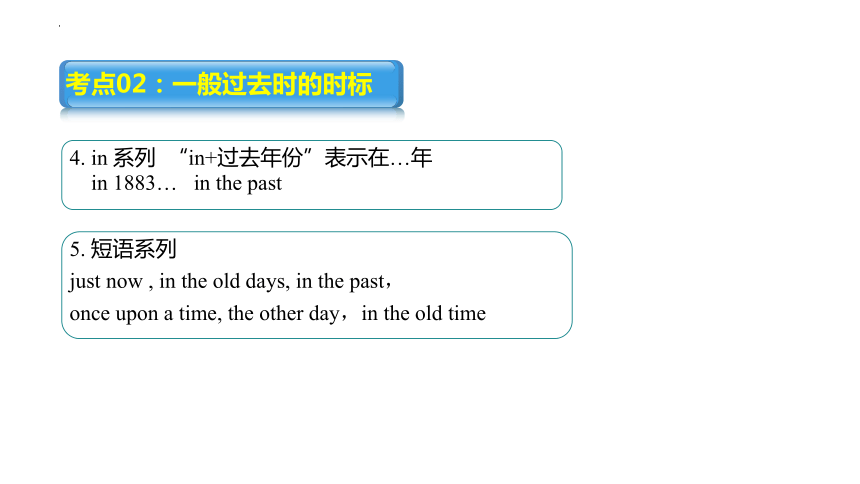


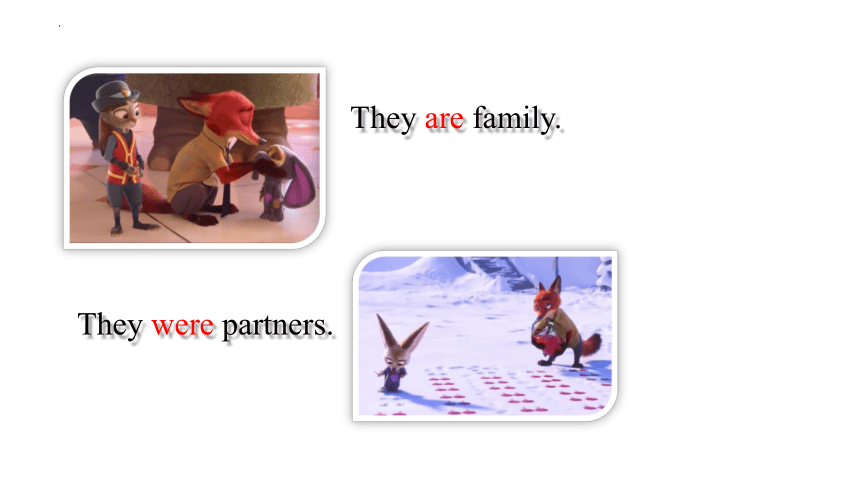
文档简介
(共38张PPT)
Unit5 Open Day
Grammar :
一般过去时
一般过去时的用法
一般过去时标志词
一般过去时的结构
动词变过去式规则
一般过去时的句型转换
1
5
3
4
2
一般过去时
now
He studies in Peking University now.
four years ago
He studied in Henan Experimental High School four years ago.
Simple Past Tense
表示过去某个时间发生的动作或存在的状态。
表示过去的习惯或经常发生的动作。
定义:
考点01:一般过去时的用法
They were happy last night.
用法一:表示过去一段时间存在的状态。
He was a singer three years ago.
考点01:一般过去时的用法
He had lunch just now.
用法二:表示过去某一段时间发生的动作或过去一段时间内经常或反复发生的动作。
She read newspapers yesterday.
考点02:一般过去时的时标
1. yesterday系列 ”昨天“
yesterday(morning/afternoon/evening…)
the day before yesterday
2. last 系列 “上一个的”
last Friday/ week/ month/ year/ spring…
3. ago 系列 “时间段+ago”表示一段时间之前
two hours ago/three weeks ago/ten years ago…
考点02:一般过去时的时标
5. 短语系列
just now , in the old days, in the past,
once upon a time, the other day,in the old time
4. in 系列 “in+过去年份”表示在…年
in 1883… in the past
Judy is a police
officer now.
Judy was a little bunny before.
考点03:一般过去时的结构
I am a police officer now.
I was a little bunny before.
考点03:一般过去时的结构
They are family.
They were partners.
She danced yesterday.
Lucy watched TV
yesterday morning.
I was a little bunny before.
They were family a month ago.
She was very happy last week.
am/is-was
are-were
考点03:一般过去时的结构
be动词的一般过去时:
肯定句:主语+was/were+其他。
用be动词的适当形式填空
1. What ______ the name of your first teacher
2.— Where ______ you last night
— I ______at my grandparents’ home.
3. Where ______ your father born
4. My parents ______ in Shanghai in 2006.
was
were
was
was
were
即学即练
She danced yesterday.
I played the piano five hours ago.
They swam three days ago.
行为动词过去式
考点03:一般过去时的结构
行为动词的一般过去时: 肯定句:主语+动词的过去式+其他。
She _______(live) in Beijing last year.
There _____(be) no one here a moment ago.
I listened but ________(hear) nothing.
She often _____(go) to school at eight o’clock.
Sally ________(go) to the zoo tomorrow.
lived
was
heard
依时定态依态定型
√
√
√
即学即练
一般过去并不难
过去动作记心间
动词要用过去式
时间标志句末站
巧学妙记
变
双
只
直
考点04:动词过去式规则变化
把下列动词变成过去式
1 climb ___________
2 play ___________
3 work ___________
4 love ___________
5 dance __________
6 study __________
7 try ___________
8 stop ___________
climbed
played
worked
loved
danced
studied
tried
stopped
即学即练
考点04:动词过去式不规则变化
动词原形和过去式相同
考点04:动词过去式不规则变化
2. 原形中的 i,过去式改为 a
考点04:动词过去式不规则变化
3. 动词原形尾部变成lt/pt/ft构成过去式
She was very happy last week.
Tom and Mary were at the library last night.
否定句:She was not very happy last week.
一般疑问句: Was she very happy last week
肯否回答: Yes, she was./ No, she wasn’t.
否定句: Tom and Mary weren’t at the library last night.
一般疑问句: Were Tom and Mary at the library last night
肯否回答: Yes, they were./ No, they weren’t.
考点05:一般过去时的句型转换
考点05:一般过去时的句型转换
否定句:主语+was/were +not +其他。
注意:was not=wasn’t
were not=weren’t
一般疑问句:Was/Were+主语+其他?
肯定回答:Yes,主语+was/were.
否定回答:No,主语+wasn’t/weren’t.
特殊疑问句:特殊疑问词+一般疑问句?
含be的结构:
否定句很简单
有be有情not填
一般疑问也好变
be动情动提前面
巧学妙记
否定句:I didn’t play the piano five hours ago.
一般疑问句: Did you play the piano five hours ago
肯否回答: Yes, I did./ No, I didn’t.
否定句: Lucy didn’t often watch TV in those days.
一般疑问句: Did Lucy often watch TV in those days
肯否回答: Yes, she did./ No, she didn’t.
I played the piano five hours ago.
Lucy often watched TV in those days.
考点05:一般过去时的句型转换
考点05:一般过去时的句型转换
否定句:主语+did + not +动原+其他。
注意:did not=didn’t
一般疑问句:Did+主语+ 动原+其他?
肯定回答:Yes,主语+did.
否定回答:No,主语+didn’t.
特殊疑问句:特殊疑问词+一般疑问句?
含行为动词的结构:
否定句很简单
did not动原前
一般疑问也好变
did放在句子前
动词一定要还原
巧学妙记
句型转换
1. They came to China in 1990.(变一般疑问句)
_____ they ______ to China in 1990
2. I was ill for two days last week.(变一般疑问句)
______ ______ ill for two days last week
3. She washed the clothes last Sunday. ( 变否定句)
She _________ ________ the clothes last Sunday
4. They went shopping last night.(对划线部分提问)
_________________________________________
Did
come
Were
you
didn’t
wash
What did they do last night
即学即练
Using
1.—Who _____ these pictures on the wall
—Kangkang did.
A.takes up B.gets up C.put up D.went up
2.He_________ me his name, but I can’t remember it now.
A.tells B.will tell C.told D.is telling
3.—Look at my new smart phone.
—Wow, it’s so cool! When and where ________ you ________ it
A.do; buy B.have; bought C.did; buy D.have; had
4.— Frank, you look worried. Anything wrong
— Well, I _________ a test and I’m waiting for the result.
A.will take B.took C.am taking D.take
5.—When you free last week
— Well, I have a free day because there was too much work.
A.did; didn’t B.were; didn’t C.were; wasn’t D.did; wasn’t
6.The girl stopped ________ but she ________ nothing.
A.to listen; hear B.to listen; heard C.hearing; heard D.listening; heard
7.—Guess what The great movie is on in the cinema.
—Nothing new. I ________ it with my parents on the first day.
A.saw B.see C.am seeing D.to see
8.John ________ his grandma every day when she was in hospital.
A.visited B.was visiting C.visits D.is visiting
9.There ________ lots of people at the restaurant when I got there.
A.is B.was C.are D.were
10.Michael ______ magic tricks. He ______ some magic tricks yesterday.
A.loved; performed B.loves; performed C.loved; performs
Keys
1.C
【详解】句意:——谁把这些照片贴到墙上的?——康康贴的。根据Kangkang did.可知是过去时态,takes up占用,一般现在时态的结构,gets up起床,一般现在时态的结构,排除A/B;根据these pictures on the wall 可知是把这些照片贴到墙上,put up张贴,went up上升,put的过去式和原形一致;故选C。
2.C
【详解】句意:他告诉过我他的名字,但是现在我不记得了。根据but I can’t remember it now可知是过去告诉过我,所以用一般过去时态;tells一般现在时态的结构, will tell一般将来时态的结构,told一般过去时态的结构,is telling现在进行时态的结构;故选C。
3.C
【详解】句意:——看看我的新智能手机。——它太酷了,你什么时候在哪里买的?
考查时态。问什么时候买的用过去时态,疑问句中,助动词did提前,动词用原形。故选C
4.B
【详解】句意:——弗兰克,你看起来很担心。有什么问题吗? ——嗯,我做了一个测试,我在等结果。
考查动词时态。根据答语中“a test”可知,考试是过去发生的动作,故应该用过去时态,故选B。
5.B
【详解】试题分析:句意:-上周你什么时候有空?-我没有一天有空,因为有很多工作。did 助动词;were是be动词的过去式形式。根据句中的last week可知,这里说的是过去的事情,free是形容词,应跟be动词搭配,故第一个空用were;第二个空后have是实意动词,故用助动词构成否定句。故选B。
考点:考查助动词。
6.B
【详解】句意:那个女孩停下来去听但是她什么也没有听到。
考查动词短语及动词辨析。固定短语stop to do sth“停下来去做某事”;stop doing sth“停止做某事”。But前后的谓语动词时态应该一致,所以排除A;hear强调听到这个结果,第一空不能用hear,所以排除C;结合句意可知这里应该指的是停下来去听,应用stop to do sth。故选B。
7.A
【详解】句意:——猜猜看发生了什么?这个好看的电影在电影院上映了。——没什么新鲜的了。我和父母在上映第一天就看了。
考查动词时态。根据“on the first day”可知电影上映不止一天了,我们在上映第一天看的,原句用一般过去时,谓语动词应用过去式saw。故选A。
8.A
【详解】句意:奶奶住院时,约翰每天去看她。
考查动词的时态。奶奶住院是过去的事情,在这期间约翰每天看望奶奶指的是过去经常反复发生的动作,用一般过去时态,动词用过去式。故选A。
9.D
【详解】句意:当我到饭店的时候,在那里有很多人。
考查there be句型和一般过去时。根据“when I got there”可知,此处使用一般过去时,描述过去发生的事情,排除A和C;主语“lots of people”是复数,be动词用were。故选D。
10.B
【详解】考查动词时态和语境辨析。句意:迈克尔喜欢魔术。他昨天表演了一些魔术。第一个空表示个人的习惯爱好,用一般现在时;第二空根据后面的yesterday昨天可知,动作发生在过去用过去式performed,故选B。
Using
11.I don’t remember when and where I _________ this umbrella.
A.buy B.have bought
C.will buy D.bought
12.—Where did you go last winter vacation
—I to London with my family.
A.go B.have gone C.went D.was going
13.______ he ______ at this school last term
A.Does; study B.Did; study C.Was; study D.Did; studied
14. you to the park last Sunday
A.Were; go B.Do; went C.Did; go D.Will; go
15.My classmates at home. They were on a school trip.
A.was B.were C.was not D.were not
16.Lisa went into the living room and _____ hands with the guests.
A.shake B.shaking C.shook D.to shake
17.There six countries in SCO(上合组织) at first, but now the number has increased to eight.
A.is B.are C.were D.will be
18.—How was the volleyball game yesterday
—Oh, it was fantastic! We ______ so much fun.
A.have B.had C.are having D.will have
19.— Did you enjoy yourself in the countryside last Sunday
— Yes, We the mountains and some great places.
A.climb; visit B.climbed; visit C.climbed; visited D.climb; visited
20.They don’t live here any longer. They to Chengdu last month.
A.move B.moved C.will move D.are moving
Keys
11.D
【详解】句意:我不记得什么时候在哪儿买的这把伞。
考查一般过去时。根据“where I ... this umbrella.”可知买伞的事情是过去发生的,所以用一般过去时。故选D。
12.C
【详解】句意:——去年寒假你去哪里了 ——我和我的家人去了伦敦。
考查一般过去时态。A. go去,动词原形,B. have gone现在完成时;C. went一般过去式;D. was going过去进行时。根据问句Where did you go last winter vacation 去年寒假你去哪里了 可知答句应用一般过去时态,go的过去式是went,故答案选C。
13.B
【详解】句意:上个学期他在这个学校里学习吗?
Does…study一般现在时,第三人称单数,一般疑问句形式;Did …study一般过去时,一般疑问句形式;Was…study形式错误;Did…studied形式错误,studied应变为原形。根据句中的时间状语last term可知,这里问的是过去的事情,应用一般过去时态,故选B。
14.C
【详解】句意:你上周日去公园了吗?
根据句意可知,是表示上周日,是过去,所以要用过去时,句子中的动词是实义动词,变一般疑问句要加助动词did,所以选择C。
【点睛】一般过去时变一般疑问句时要注意原句中的动词,如果动词是实义动词,就需要加助动词did,加了助动词之后,动词要变回原形。
15.D
【详解】句意:我的同学们都不在家。他们在参加学校的郊游(活动)。
由were可知,用一般过去时,且根据They were on a school trip可知,他们不在家,用否定,排除A和B;主语是可数名词复数形式classmates,用复数,故用were not,故选D。
16.C
【详解】句意:丽莎走进起居室,与客人握手。考查动词时态辨析题。and连接并列结构,前后时态需一致,went是动词go的过去式,根据句意结构,可知选C。
17.C
【详解】句意:上合组织最初有六个国家,但现在已经增加到八个。at first最初,此处是指过去的时间,故时态为一般过去时,答案为C。
点睛:There be 句型是英语中常用句型,意思是“有”,表示“人或事物的存在”。There be 后面的名词是句子的主语,属倒装结构。因此要表达“某个地方或某个时间存在什么事物或人”的时候常用“There be + 名词+ 地点(时间)这一句型。There be 句型的时态要通过be体现出来,如:There is an apple on the table. (一般现在时)桌子上有一个苹果。There were many people in the park last Sunday.(一般过去时) 上个星期天公园里有许多人。There will be an important football match tonight.(一般将来时) 今晚将有一场重要的足球比赛。
18.B
【详解】句意:-昨天的排球比赛怎么样?-哦,太棒了!我们玩得很开心。Have fun意为“玩得开心”,have so much fun意为“玩得非常开心”。A是一般现在时动词原形,B是一般过去时,C是现在进行时,D是一般将来时,从前句的yesterday(昨天)得知排球比赛是在昨天,所以是昨天玩得开心,动作发生在过去,需要使用一般过去时,故把have变为过去时had即可,选B。
19.C
【详解】句意:-你上周天在乡下玩的开心吗?-是的,我们爬了山,参观了许多很棒的地方。动词climb意为“爬”,动词visit意为“参观”,这里是在描述上周天的活动,所以这两个动作均需要使用一般过去时的形式climbed和visited,故选C。
20.B
【详解】句意:他们不再住在这里了,他们上个月搬到了成都。考查一般过去时。A. move一般现在时;B. moved一般过去时;C. will move一般将来时;D. are moving现在进行时。根据They don’t live here any longer.可知此处句意为“他们上个月搬到了成都。”由last month可知时态用一般过去时;故答案选B。
Using
21.Why did the child ______ crying last night
A.came on B.come on
C.keep on D.kept on
22.As we all know, the Silk Road _______ China to the west in ancient times.
A.connects B.connected C.will connect D.is connecting
23.______ you ______ to the park last week?
A.Were, go B.Did, go C.Were, went D.Did, went
24.The teacher told her ______ late, but she ______ late this morning.
A.isn’t; is B.not to be; is
C.wasn’t; was D.not to be; was
25.—Did you an English class last Saturday
—Yes, we .
A.had ; did B.had ; had C.have ; had D.have;did
26.—Why didn't you come to my party
—I _____stay at home,because my mother was ill.
A.has to B.have to C.had D.had to
27.He got up late this morning. There _______ no time to have breakfast.
A.have B.had C.was D.were
28.Lily _______ read the book from ________ after supper.
A.began to; beginning B.began; beginning
C.began; the beginning D.began to; the beginning
29.-----________ you _______the Chinese Culture Festival in the Central Square
-----Yes. It was really a great success.
A.Are…attending B.Will…attend C.Do…attend D.Did…attend
30.—_____ the population of the U.S.A.in 2005 —It _____ about 296 million.
A.What is; is B.What was; was C.How many is; was D.How many was; is
Keys
21.C
【详解】句意:那孩子昨晚为什么一直哭?考查动词短语。B. come on快点,加油,不及物动词; keep on坚持, 继续,短语keep on doing sth.:坚持做某事,一直做某事;本句是why引导的特殊疑问句,助动词did后面跟动词原形,came on和kept on是一般过去时,可知排除A和D;结合句意可知选C。
22.B
【详解】句意:众所周知,在古代丝绸之路是连接中国和西方的。
考查动词时态。根据“in ancient times在古代”可知,句子应用一般过去时,动词用过去式,故选B。
23.B
【分析】
【详解】句意:上周你去公园了吗?
考查动词的时态。根据时间状语 last week可知用一般过去式,一般过去式的一般疑问句Did+主语+动词的原型+其他。故选B。
24.D
【详解】句意:老师告诉她不要迟到,但她今天早上迟到了。
考查非谓语动词和时态。tell sb not to do sth“告诉某人不要做某事”,所以第一空应填not to be;根据“this morning”可知第二句应用一般过去时,be动词应用was。故选D。
25.D
【详解】句意:-------上星期六你们上英语课了吗?----是的,我们上课了。助动词did后跟动词原形,首先排除A,B;以Did开头的一般疑问句,肯定的回答为Yes, …did.故答案为D。
26.D
【详解】句意:--为什么你没有来参加我的聚会?--我不得不呆在家里,因为我的妈妈生病了。根据was ill可知,生病发生在过去,所以不得不呆在家里也发生在过去,所以用had to不得不。后加动词原形。故选D。
27.C
【详解】句意:他今天早上起晚了,没有时间吃早餐。
考查there be句型。根据“He got up late this morning.”可知原句是一般过去时,there is no time to do sth.“没有时间做某事”,是固定句型,is要用过去式was,故选C。
28.D
【详解】句意:晚饭后莉莉开始从头读这本书。
短语begin to do sth.表示开始做某事;the beginning表示开始。根据题意,故选D。
29.D
【详解】句意:——你参加了中央广场的中国文化节吗?——是的。这真是一个巨大的成功。考查动词时态辨析题。根据答语It was really a great success.,可知是过去的动作,需用一般过去时,可排除ABC三个选项,故选D。
30.B
【详解】句意:——美国2005年的人口是多少?——约2亿9600万。
询问人口多少使用句型“What’s the population of…… ”不用How many来提问,排除C,D;根据“in 2005”判断,表示过去的时间状语,句子用一般过去时来表达。所以选B。
Using
31.—Did Billy and Anna find a way out at last
—Yes, they ___________ a plan and did it.
A.were working out B.worked out
C.are working out D.have worked out
32.—Where did you go last weekend
—I __________ to the Great Wall.
A.go B.went
C.will go D.have gone
33.Bella, a young singer, ______ on January, 2015 because of cancer. Her death made us very sad.
A.has been dead B.has died
C.was dead D.died
34.A car accident ___________ on this road a few days ago.
A.was happening B.is happened
C.was happened D.happened
35.—What ______ the noise, Bill
—Sorry, I broke my glass.
A.is B.was C.has been D.will be
36.Last night I _________ very tired and I ________ to bed early.
A.was, go B.was, went C.am, went D.am, go
37.— When and where ____ you born
—I ____ born in Shanghai ___ September 1, 1990.
A.was, were, at B.were, was, in C.was, was, on D.were, was, on
38.David is a tennis player. He to play tennis when he was six years old.
A.begins B.will begin C.began D.has begun
39.The girl ________ by the window and saw some boys ________ volleyball outside.
A.sits; to play B.sits; play
C.sat; to play D.sat; playing
40.John and I ________ to visit his grandparents last Sunday afternoon.
A.go B.went C.will go D.have gone
Keys
31.B
【详解】句意:——比利和安娜最后找到方法了吗?——是的,他们做好了计划并且找到了方法。
考查动词的时态。根据and后的动词did可知,空格处也应该用一般过去时。故选B。
32.B
【详解】试题分析:句意:——上个周末你去哪里了?——我去长城了。根据时间状语last weekend可知此处用一般过去时,故用动词的过去式went。故选B。
考点:考查一般过去时的用法。
33.D
【详解】句意:贝拉,一位年轻的歌手在2015年的1月因为癌症去世了。她的死让我们很难过。
考查一般过去时。根据时间“on January, 2015”可知用过去式,“die”意为“死”,表示生命的结束,是不及物动词,不能用于被动语态;又因为died为短暂性动词,不能用于现在完成时,故选D。
34.D
【详解】句意:几天前在这条路上发生了一起车祸。
考查动词的时态。根据时间状语可知,时态为一般过去时态,happen无被动语态。故选D。
35.B
【详解】句意:噪音是什么 比尔.——抱歉,我打碎了玻璃杯。结合语境可知上文描述的是刚才发生的动作,故用一般过去时态。主语是动作对象,故用被动语态,选B。
考点:时态
36.B
【详解】考查动词时态的用法。句意:Last night I was very tired and I went to bed early.昨晚我很累,很早就睡觉了。依据Last night昨晚可知,时态要用一般过去时态,C D排除。And连接两个并列句前后时态要一致。故选B。
37.D
【详解】此题考查固定短语be born的be的基本用法。第一个空格的主语是you故用were;第二个空格的主语是I故用was,确指某一天时要用介词on。故选D。
38.C
【详解】句意:戴维是个网球运动员,六岁时就开始打网球了。从when he was six years old判断句子时态用一般过去时。故选C。
39.D
【详解】句意“这个小女孩坐在窗户旁边看一些小男孩在外面打排球”。sit坐,过去时为sat。根据and后的saw可知,用一般过去时,排除A和B。see sb doing“看……正在做”;see sb do“看到全过程”。根据句意可知,表示“看到小男孩正在打排球”,故选D。
40.B
【详解】句意:上个星期天下午,我和约翰去拜访他的祖父母。go动词,去;根据last Sunday afternoon可知,本句应使用一般过去时态表达,went是go的过去式。故选B。
Unit5 Open Day
Grammar :
一般过去时
一般过去时的用法
一般过去时标志词
一般过去时的结构
动词变过去式规则
一般过去时的句型转换
1
5
3
4
2
一般过去时
now
He studies in Peking University now.
four years ago
He studied in Henan Experimental High School four years ago.
Simple Past Tense
表示过去某个时间发生的动作或存在的状态。
表示过去的习惯或经常发生的动作。
定义:
考点01:一般过去时的用法
They were happy last night.
用法一:表示过去一段时间存在的状态。
He was a singer three years ago.
考点01:一般过去时的用法
He had lunch just now.
用法二:表示过去某一段时间发生的动作或过去一段时间内经常或反复发生的动作。
She read newspapers yesterday.
考点02:一般过去时的时标
1. yesterday系列 ”昨天“
yesterday(morning/afternoon/evening…)
the day before yesterday
2. last 系列 “上一个的”
last Friday/ week/ month/ year/ spring…
3. ago 系列 “时间段+ago”表示一段时间之前
two hours ago/three weeks ago/ten years ago…
考点02:一般过去时的时标
5. 短语系列
just now , in the old days, in the past,
once upon a time, the other day,in the old time
4. in 系列 “in+过去年份”表示在…年
in 1883… in the past
Judy is a police
officer now.
Judy was a little bunny before.
考点03:一般过去时的结构
I am a police officer now.
I was a little bunny before.
考点03:一般过去时的结构
They are family.
They were partners.
She danced yesterday.
Lucy watched TV
yesterday morning.
I was a little bunny before.
They were family a month ago.
She was very happy last week.
am/is-was
are-were
考点03:一般过去时的结构
be动词的一般过去时:
肯定句:主语+was/were+其他。
用be动词的适当形式填空
1. What ______ the name of your first teacher
2.— Where ______ you last night
— I ______at my grandparents’ home.
3. Where ______ your father born
4. My parents ______ in Shanghai in 2006.
was
were
was
was
were
即学即练
She danced yesterday.
I played the piano five hours ago.
They swam three days ago.
行为动词过去式
考点03:一般过去时的结构
行为动词的一般过去时: 肯定句:主语+动词的过去式+其他。
She _______(live) in Beijing last year.
There _____(be) no one here a moment ago.
I listened but ________(hear) nothing.
She often _____(go) to school at eight o’clock.
Sally ________(go) to the zoo tomorrow.
lived
was
heard
依时定态依态定型
√
√
√
即学即练
一般过去并不难
过去动作记心间
动词要用过去式
时间标志句末站
巧学妙记
变
双
只
直
考点04:动词过去式规则变化
把下列动词变成过去式
1 climb ___________
2 play ___________
3 work ___________
4 love ___________
5 dance __________
6 study __________
7 try ___________
8 stop ___________
climbed
played
worked
loved
danced
studied
tried
stopped
即学即练
考点04:动词过去式不规则变化
动词原形和过去式相同
考点04:动词过去式不规则变化
2. 原形中的 i,过去式改为 a
考点04:动词过去式不规则变化
3. 动词原形尾部变成lt/pt/ft构成过去式
She was very happy last week.
Tom and Mary were at the library last night.
否定句:She was not very happy last week.
一般疑问句: Was she very happy last week
肯否回答: Yes, she was./ No, she wasn’t.
否定句: Tom and Mary weren’t at the library last night.
一般疑问句: Were Tom and Mary at the library last night
肯否回答: Yes, they were./ No, they weren’t.
考点05:一般过去时的句型转换
考点05:一般过去时的句型转换
否定句:主语+was/were +not +其他。
注意:was not=wasn’t
were not=weren’t
一般疑问句:Was/Were+主语+其他?
肯定回答:Yes,主语+was/were.
否定回答:No,主语+wasn’t/weren’t.
特殊疑问句:特殊疑问词+一般疑问句?
含be的结构:
否定句很简单
有be有情not填
一般疑问也好变
be动情动提前面
巧学妙记
否定句:I didn’t play the piano five hours ago.
一般疑问句: Did you play the piano five hours ago
肯否回答: Yes, I did./ No, I didn’t.
否定句: Lucy didn’t often watch TV in those days.
一般疑问句: Did Lucy often watch TV in those days
肯否回答: Yes, she did./ No, she didn’t.
I played the piano five hours ago.
Lucy often watched TV in those days.
考点05:一般过去时的句型转换
考点05:一般过去时的句型转换
否定句:主语+did + not +动原+其他。
注意:did not=didn’t
一般疑问句:Did+主语+ 动原+其他?
肯定回答:Yes,主语+did.
否定回答:No,主语+didn’t.
特殊疑问句:特殊疑问词+一般疑问句?
含行为动词的结构:
否定句很简单
did not动原前
一般疑问也好变
did放在句子前
动词一定要还原
巧学妙记
句型转换
1. They came to China in 1990.(变一般疑问句)
_____ they ______ to China in 1990
2. I was ill for two days last week.(变一般疑问句)
______ ______ ill for two days last week
3. She washed the clothes last Sunday. ( 变否定句)
She _________ ________ the clothes last Sunday
4. They went shopping last night.(对划线部分提问)
_________________________________________
Did
come
Were
you
didn’t
wash
What did they do last night
即学即练
Using
1.—Who _____ these pictures on the wall
—Kangkang did.
A.takes up B.gets up C.put up D.went up
2.He_________ me his name, but I can’t remember it now.
A.tells B.will tell C.told D.is telling
3.—Look at my new smart phone.
—Wow, it’s so cool! When and where ________ you ________ it
A.do; buy B.have; bought C.did; buy D.have; had
4.— Frank, you look worried. Anything wrong
— Well, I _________ a test and I’m waiting for the result.
A.will take B.took C.am taking D.take
5.—When you free last week
— Well, I have a free day because there was too much work.
A.did; didn’t B.were; didn’t C.were; wasn’t D.did; wasn’t
6.The girl stopped ________ but she ________ nothing.
A.to listen; hear B.to listen; heard C.hearing; heard D.listening; heard
7.—Guess what The great movie is on in the cinema.
—Nothing new. I ________ it with my parents on the first day.
A.saw B.see C.am seeing D.to see
8.John ________ his grandma every day when she was in hospital.
A.visited B.was visiting C.visits D.is visiting
9.There ________ lots of people at the restaurant when I got there.
A.is B.was C.are D.were
10.Michael ______ magic tricks. He ______ some magic tricks yesterday.
A.loved; performed B.loves; performed C.loved; performs
Keys
1.C
【详解】句意:——谁把这些照片贴到墙上的?——康康贴的。根据Kangkang did.可知是过去时态,takes up占用,一般现在时态的结构,gets up起床,一般现在时态的结构,排除A/B;根据these pictures on the wall 可知是把这些照片贴到墙上,put up张贴,went up上升,put的过去式和原形一致;故选C。
2.C
【详解】句意:他告诉过我他的名字,但是现在我不记得了。根据but I can’t remember it now可知是过去告诉过我,所以用一般过去时态;tells一般现在时态的结构, will tell一般将来时态的结构,told一般过去时态的结构,is telling现在进行时态的结构;故选C。
3.C
【详解】句意:——看看我的新智能手机。——它太酷了,你什么时候在哪里买的?
考查时态。问什么时候买的用过去时态,疑问句中,助动词did提前,动词用原形。故选C
4.B
【详解】句意:——弗兰克,你看起来很担心。有什么问题吗? ——嗯,我做了一个测试,我在等结果。
考查动词时态。根据答语中“a test”可知,考试是过去发生的动作,故应该用过去时态,故选B。
5.B
【详解】试题分析:句意:-上周你什么时候有空?-我没有一天有空,因为有很多工作。did 助动词;were是be动词的过去式形式。根据句中的last week可知,这里说的是过去的事情,free是形容词,应跟be动词搭配,故第一个空用were;第二个空后have是实意动词,故用助动词构成否定句。故选B。
考点:考查助动词。
6.B
【详解】句意:那个女孩停下来去听但是她什么也没有听到。
考查动词短语及动词辨析。固定短语stop to do sth“停下来去做某事”;stop doing sth“停止做某事”。But前后的谓语动词时态应该一致,所以排除A;hear强调听到这个结果,第一空不能用hear,所以排除C;结合句意可知这里应该指的是停下来去听,应用stop to do sth。故选B。
7.A
【详解】句意:——猜猜看发生了什么?这个好看的电影在电影院上映了。——没什么新鲜的了。我和父母在上映第一天就看了。
考查动词时态。根据“on the first day”可知电影上映不止一天了,我们在上映第一天看的,原句用一般过去时,谓语动词应用过去式saw。故选A。
8.A
【详解】句意:奶奶住院时,约翰每天去看她。
考查动词的时态。奶奶住院是过去的事情,在这期间约翰每天看望奶奶指的是过去经常反复发生的动作,用一般过去时态,动词用过去式。故选A。
9.D
【详解】句意:当我到饭店的时候,在那里有很多人。
考查there be句型和一般过去时。根据“when I got there”可知,此处使用一般过去时,描述过去发生的事情,排除A和C;主语“lots of people”是复数,be动词用were。故选D。
10.B
【详解】考查动词时态和语境辨析。句意:迈克尔喜欢魔术。他昨天表演了一些魔术。第一个空表示个人的习惯爱好,用一般现在时;第二空根据后面的yesterday昨天可知,动作发生在过去用过去式performed,故选B。
Using
11.I don’t remember when and where I _________ this umbrella.
A.buy B.have bought
C.will buy D.bought
12.—Where did you go last winter vacation
—I to London with my family.
A.go B.have gone C.went D.was going
13.______ he ______ at this school last term
A.Does; study B.Did; study C.Was; study D.Did; studied
14. you to the park last Sunday
A.Were; go B.Do; went C.Did; go D.Will; go
15.My classmates at home. They were on a school trip.
A.was B.were C.was not D.were not
16.Lisa went into the living room and _____ hands with the guests.
A.shake B.shaking C.shook D.to shake
17.There six countries in SCO(上合组织) at first, but now the number has increased to eight.
A.is B.are C.were D.will be
18.—How was the volleyball game yesterday
—Oh, it was fantastic! We ______ so much fun.
A.have B.had C.are having D.will have
19.— Did you enjoy yourself in the countryside last Sunday
— Yes, We the mountains and some great places.
A.climb; visit B.climbed; visit C.climbed; visited D.climb; visited
20.They don’t live here any longer. They to Chengdu last month.
A.move B.moved C.will move D.are moving
Keys
11.D
【详解】句意:我不记得什么时候在哪儿买的这把伞。
考查一般过去时。根据“where I ... this umbrella.”可知买伞的事情是过去发生的,所以用一般过去时。故选D。
12.C
【详解】句意:——去年寒假你去哪里了 ——我和我的家人去了伦敦。
考查一般过去时态。A. go去,动词原形,B. have gone现在完成时;C. went一般过去式;D. was going过去进行时。根据问句Where did you go last winter vacation 去年寒假你去哪里了 可知答句应用一般过去时态,go的过去式是went,故答案选C。
13.B
【详解】句意:上个学期他在这个学校里学习吗?
Does…study一般现在时,第三人称单数,一般疑问句形式;Did …study一般过去时,一般疑问句形式;Was…study形式错误;Did…studied形式错误,studied应变为原形。根据句中的时间状语last term可知,这里问的是过去的事情,应用一般过去时态,故选B。
14.C
【详解】句意:你上周日去公园了吗?
根据句意可知,是表示上周日,是过去,所以要用过去时,句子中的动词是实义动词,变一般疑问句要加助动词did,所以选择C。
【点睛】一般过去时变一般疑问句时要注意原句中的动词,如果动词是实义动词,就需要加助动词did,加了助动词之后,动词要变回原形。
15.D
【详解】句意:我的同学们都不在家。他们在参加学校的郊游(活动)。
由were可知,用一般过去时,且根据They were on a school trip可知,他们不在家,用否定,排除A和B;主语是可数名词复数形式classmates,用复数,故用were not,故选D。
16.C
【详解】句意:丽莎走进起居室,与客人握手。考查动词时态辨析题。and连接并列结构,前后时态需一致,went是动词go的过去式,根据句意结构,可知选C。
17.C
【详解】句意:上合组织最初有六个国家,但现在已经增加到八个。at first最初,此处是指过去的时间,故时态为一般过去时,答案为C。
点睛:There be 句型是英语中常用句型,意思是“有”,表示“人或事物的存在”。There be 后面的名词是句子的主语,属倒装结构。因此要表达“某个地方或某个时间存在什么事物或人”的时候常用“There be + 名词+ 地点(时间)这一句型。There be 句型的时态要通过be体现出来,如:There is an apple on the table. (一般现在时)桌子上有一个苹果。There were many people in the park last Sunday.(一般过去时) 上个星期天公园里有许多人。There will be an important football match tonight.(一般将来时) 今晚将有一场重要的足球比赛。
18.B
【详解】句意:-昨天的排球比赛怎么样?-哦,太棒了!我们玩得很开心。Have fun意为“玩得开心”,have so much fun意为“玩得非常开心”。A是一般现在时动词原形,B是一般过去时,C是现在进行时,D是一般将来时,从前句的yesterday(昨天)得知排球比赛是在昨天,所以是昨天玩得开心,动作发生在过去,需要使用一般过去时,故把have变为过去时had即可,选B。
19.C
【详解】句意:-你上周天在乡下玩的开心吗?-是的,我们爬了山,参观了许多很棒的地方。动词climb意为“爬”,动词visit意为“参观”,这里是在描述上周天的活动,所以这两个动作均需要使用一般过去时的形式climbed和visited,故选C。
20.B
【详解】句意:他们不再住在这里了,他们上个月搬到了成都。考查一般过去时。A. move一般现在时;B. moved一般过去时;C. will move一般将来时;D. are moving现在进行时。根据They don’t live here any longer.可知此处句意为“他们上个月搬到了成都。”由last month可知时态用一般过去时;故答案选B。
Using
21.Why did the child ______ crying last night
A.came on B.come on
C.keep on D.kept on
22.As we all know, the Silk Road _______ China to the west in ancient times.
A.connects B.connected C.will connect D.is connecting
23.______ you ______ to the park last week?
A.Were, go B.Did, go C.Were, went D.Did, went
24.The teacher told her ______ late, but she ______ late this morning.
A.isn’t; is B.not to be; is
C.wasn’t; was D.not to be; was
25.—Did you an English class last Saturday
—Yes, we .
A.had ; did B.had ; had C.have ; had D.have;did
26.—Why didn't you come to my party
—I _____stay at home,because my mother was ill.
A.has to B.have to C.had D.had to
27.He got up late this morning. There _______ no time to have breakfast.
A.have B.had C.was D.were
28.Lily _______ read the book from ________ after supper.
A.began to; beginning B.began; beginning
C.began; the beginning D.began to; the beginning
29.-----________ you _______the Chinese Culture Festival in the Central Square
-----Yes. It was really a great success.
A.Are…attending B.Will…attend C.Do…attend D.Did…attend
30.—_____ the population of the U.S.A.in 2005 —It _____ about 296 million.
A.What is; is B.What was; was C.How many is; was D.How many was; is
Keys
21.C
【详解】句意:那孩子昨晚为什么一直哭?考查动词短语。B. come on快点,加油,不及物动词; keep on坚持, 继续,短语keep on doing sth.:坚持做某事,一直做某事;本句是why引导的特殊疑问句,助动词did后面跟动词原形,came on和kept on是一般过去时,可知排除A和D;结合句意可知选C。
22.B
【详解】句意:众所周知,在古代丝绸之路是连接中国和西方的。
考查动词时态。根据“in ancient times在古代”可知,句子应用一般过去时,动词用过去式,故选B。
23.B
【分析】
【详解】句意:上周你去公园了吗?
考查动词的时态。根据时间状语 last week可知用一般过去式,一般过去式的一般疑问句Did+主语+动词的原型+其他。故选B。
24.D
【详解】句意:老师告诉她不要迟到,但她今天早上迟到了。
考查非谓语动词和时态。tell sb not to do sth“告诉某人不要做某事”,所以第一空应填not to be;根据“this morning”可知第二句应用一般过去时,be动词应用was。故选D。
25.D
【详解】句意:-------上星期六你们上英语课了吗?----是的,我们上课了。助动词did后跟动词原形,首先排除A,B;以Did开头的一般疑问句,肯定的回答为Yes, …did.故答案为D。
26.D
【详解】句意:--为什么你没有来参加我的聚会?--我不得不呆在家里,因为我的妈妈生病了。根据was ill可知,生病发生在过去,所以不得不呆在家里也发生在过去,所以用had to不得不。后加动词原形。故选D。
27.C
【详解】句意:他今天早上起晚了,没有时间吃早餐。
考查there be句型。根据“He got up late this morning.”可知原句是一般过去时,there is no time to do sth.“没有时间做某事”,是固定句型,is要用过去式was,故选C。
28.D
【详解】句意:晚饭后莉莉开始从头读这本书。
短语begin to do sth.表示开始做某事;the beginning表示开始。根据题意,故选D。
29.D
【详解】句意:——你参加了中央广场的中国文化节吗?——是的。这真是一个巨大的成功。考查动词时态辨析题。根据答语It was really a great success.,可知是过去的动作,需用一般过去时,可排除ABC三个选项,故选D。
30.B
【详解】句意:——美国2005年的人口是多少?——约2亿9600万。
询问人口多少使用句型“What’s the population of…… ”不用How many来提问,排除C,D;根据“in 2005”判断,表示过去的时间状语,句子用一般过去时来表达。所以选B。
Using
31.—Did Billy and Anna find a way out at last
—Yes, they ___________ a plan and did it.
A.were working out B.worked out
C.are working out D.have worked out
32.—Where did you go last weekend
—I __________ to the Great Wall.
A.go B.went
C.will go D.have gone
33.Bella, a young singer, ______ on January, 2015 because of cancer. Her death made us very sad.
A.has been dead B.has died
C.was dead D.died
34.A car accident ___________ on this road a few days ago.
A.was happening B.is happened
C.was happened D.happened
35.—What ______ the noise, Bill
—Sorry, I broke my glass.
A.is B.was C.has been D.will be
36.Last night I _________ very tired and I ________ to bed early.
A.was, go B.was, went C.am, went D.am, go
37.— When and where ____ you born
—I ____ born in Shanghai ___ September 1, 1990.
A.was, were, at B.were, was, in C.was, was, on D.were, was, on
38.David is a tennis player. He to play tennis when he was six years old.
A.begins B.will begin C.began D.has begun
39.The girl ________ by the window and saw some boys ________ volleyball outside.
A.sits; to play B.sits; play
C.sat; to play D.sat; playing
40.John and I ________ to visit his grandparents last Sunday afternoon.
A.go B.went C.will go D.have gone
Keys
31.B
【详解】句意:——比利和安娜最后找到方法了吗?——是的,他们做好了计划并且找到了方法。
考查动词的时态。根据and后的动词did可知,空格处也应该用一般过去时。故选B。
32.B
【详解】试题分析:句意:——上个周末你去哪里了?——我去长城了。根据时间状语last weekend可知此处用一般过去时,故用动词的过去式went。故选B。
考点:考查一般过去时的用法。
33.D
【详解】句意:贝拉,一位年轻的歌手在2015年的1月因为癌症去世了。她的死让我们很难过。
考查一般过去时。根据时间“on January, 2015”可知用过去式,“die”意为“死”,表示生命的结束,是不及物动词,不能用于被动语态;又因为died为短暂性动词,不能用于现在完成时,故选D。
34.D
【详解】句意:几天前在这条路上发生了一起车祸。
考查动词的时态。根据时间状语可知,时态为一般过去时态,happen无被动语态。故选D。
35.B
【详解】句意:噪音是什么 比尔.——抱歉,我打碎了玻璃杯。结合语境可知上文描述的是刚才发生的动作,故用一般过去时态。主语是动作对象,故用被动语态,选B。
考点:时态
36.B
【详解】考查动词时态的用法。句意:Last night I was very tired and I went to bed early.昨晚我很累,很早就睡觉了。依据Last night昨晚可知,时态要用一般过去时态,C D排除。And连接两个并列句前后时态要一致。故选B。
37.D
【详解】此题考查固定短语be born的be的基本用法。第一个空格的主语是you故用were;第二个空格的主语是I故用was,确指某一天时要用介词on。故选D。
38.C
【详解】句意:戴维是个网球运动员,六岁时就开始打网球了。从when he was six years old判断句子时态用一般过去时。故选C。
39.D
【详解】句意“这个小女孩坐在窗户旁边看一些小男孩在外面打排球”。sit坐,过去时为sat。根据and后的saw可知,用一般过去时,排除A和B。see sb doing“看……正在做”;see sb do“看到全过程”。根据句意可知,表示“看到小男孩正在打排球”,故选D。
40.B
【详解】句意:上个星期天下午,我和约翰去拜访他的祖父母。go动词,去;根据last Sunday afternoon可知,本句应使用一般过去时态表达,went是go的过去式。故选B。
同课章节目录
- Module 1 Family and friends
- Unit 1 Family and relatives
- Unit 2 I have a good friend
- Unit 3 Spending a day out togethe
- Module 2 Places and activities
- Unit 4 What would you like to be?
- Unit 5 Open Day
- Unit 6 Going to school
- Unit 7 Rules round us
- Module 3 Food and drink
- Unit 8 The food we eat
- Unit 9 Picnics are fun
- Unit 10 Healthy eating
- Unit 11 Let's make a pizza
